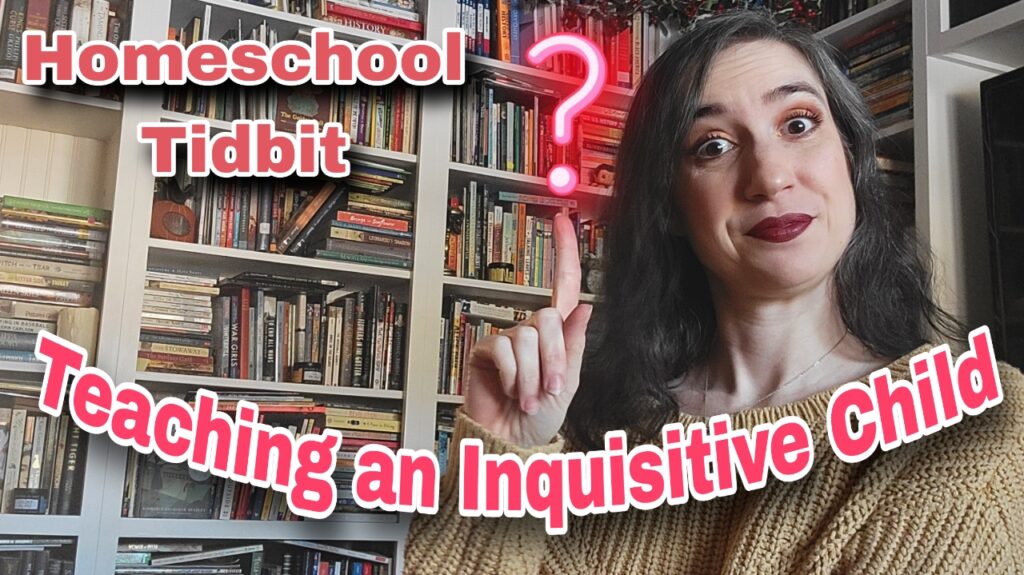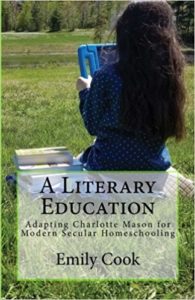Homeschool Tidbits: Homeschooling an Inquisitive Child
January 19, 2024
 Welcome to Build Your Library’s Homeschool Tidbits: Episode 65 – Homeschooling an Inquisitive Child. In this weekly video series, I will delve briefly into a topic related to homeschooling and will share some of my knowledge and expertise as a long-time homeschooling mother of 4 children. Three of whom have graduated high school, and one who is a college graduate!
Welcome to Build Your Library’s Homeschool Tidbits: Episode 65 – Homeschooling an Inquisitive Child. In this weekly video series, I will delve briefly into a topic related to homeschooling and will share some of my knowledge and expertise as a long-time homeschooling mother of 4 children. Three of whom have graduated high school, and one who is a college graduate!
We know that children are prone to asking questions, and we want to encourage that! But what do you do when your child asks a constant stream of questions? How can you keep up without derailing your day? If this isn’t your child, today’s video might not be useful to you. But if you know exactly what I’m talking about, keep watching! I’ve got a few pro tips to help you homeschool your inquisitive child!
My youngest child is inquisitive. She always has been. And I’ve always encouraged my children to ask questions, so of course, I prided myself on how many questions she asked in a day. I’m not even kidding when I say that my youngest is made of questions. I’ve always done my best to answer her or at least help her find the answers to her questions. Even to the point of building unit studies for her. And believe me when I say that I LOVE how curious she is!
But there came a point last year when I realized that I had allowed her to derail our lessons to the point that we weren’t getting through as much of the material as I thought we should. Her questions would often steer us off course in my efforts to ensure that she found the answers she sought.
I had to sit down and think about what I could do to solve this dilemma. I realize that many would think this is a good problem to have. We want to raise children who ask questions and seek out the answers, isn’t that the whole point of education? But I needed to find a way to keep us from derailing our routine. We are in high school now, and we can’t follow every rabbit trail that sprouts up.
The first thing I’ve started doing whenever she begins to ask a question is to ask if it’s on topic. This is probably obvious, but sometimes she’d ask a question that just occurred to her about something we’d read an hour ago, or that she had been mulling over for a day. If she says no, then I ask her to hold that question until later so that we can continue the lesson. She’s got a good memory, so she’ll often still come to me with her questions later in the day – usually at lunch, and we can tackle it then. This has gone a long way to keeping us on track with our lessons.
I’ve seen the idea of wonder boards, which is a cute idea, but my daughter is nearly 15, and I thought she might find it babyish. But it did give me an idea. I’m going to start having her keep a notebook nearby while we are doing our lessons. Whenever a question pops into her head, she can write it in her questions journal. Not only will this keep us on task, but it will also give her some extra practice with her arch-nemesis – writing. Then we can go over her litany of questions at the end of our school day. Anything that is pressing, we can spend some time exploring.
Another thing that I’ve always done, but am now doing more in earnest, is strewing. I first learned about strewing many years ago in an article about unschooling. The idea is that rather than create a formal lesson plan, you leave materials on a topic your child is interested in just lying around the house so they will naturally pick them up throughout their day. I’ve found that, for us, anyway, strewing alone isn’t enough, because my kids are more likely to ignore it, even if it is something they are specifically interested in.
What I do instead is offer one thing, typically a book or a video, perhaps even a field trip, to help them explore their interest further. For example, my daughter, who is 14, was asking me a lot of questions about drugs. She had heard someone talking about it, and it led to an avalanche of questions that had started to interrupt our school day. So I offered her a book that she could use to find answers on her own. Sometimes that’s all it takes – her curiosity has been satisfied, and we can get ourselves back on track…until the next time she gets an attack of the questions.
What I never do, is tell her to stop interrupting with questions. I want her to know that questions are good, that they lead to learning, and that we will always be willing to help her find the answers. However, we might not be able to stop everything to answer them at the moment, but we will circle back when we finish our current lesson.
Homeschooling a very inquisitive child is an adventure that requires patience, flexibility, and a willingness to embrace their curiosity! By nurturing their sense of wonder and providing a supportive learning environment, you can help your child to thrive as a curious learner who is eager to explore the world around them.
Do you have an inquisitive child? What is your best tip for helping them answer their questions without derailing your day? Let’s chat about it in the comments!
Coming up next…
I hope you found this Tidbit helpful! Come back next week for more homeschooling inspiration!
Until then, happy reading!
See Other Related Articles:
- Happy, Hygge Homeschooling?
- “Are worms made out of metal?” And other great rabbit trails.
- Charlotte Mason in the Secular Homeschool
- A Literary Education book
- About Build Your Library
- Homeschool Tidbits: Build Your Library’s Weekly Video Blog Series
.
 Emily Cook is the author and creator of the secular homeschool curriculum Build Your Library, a literature-based K-12 program infused with the teachings of Charlotte Mason. She writes full-year lesson plans as well as shorter topical unit studies. Emily has been homeschooling her four children in Southern NH for 21 years. She is passionate about reading aloud to children of all ages and loves sharing her love of literature. She and her family also make incredibly dorky videos about homeschooling, books, and more on YouTube at ARRRGH! Schooling. You can follow her on Facebook, Twitter, and Pinterest. You can also check out her author page on Amazon.
Emily Cook is the author and creator of the secular homeschool curriculum Build Your Library, a literature-based K-12 program infused with the teachings of Charlotte Mason. She writes full-year lesson plans as well as shorter topical unit studies. Emily has been homeschooling her four children in Southern NH for 21 years. She is passionate about reading aloud to children of all ages and loves sharing her love of literature. She and her family also make incredibly dorky videos about homeschooling, books, and more on YouTube at ARRRGH! Schooling. You can follow her on Facebook, Twitter, and Pinterest. You can also check out her author page on Amazon.
